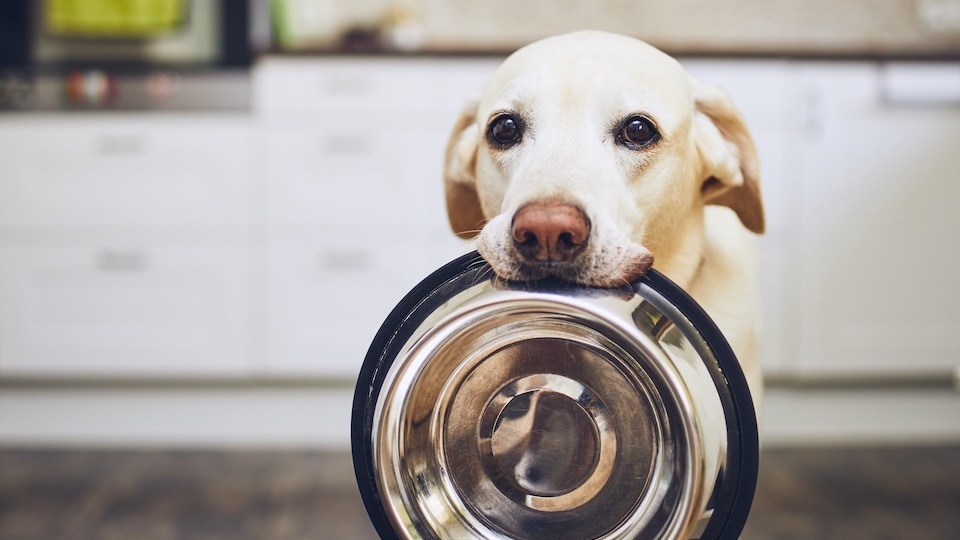Multiple popular dog food brands have recently been recalled after a random test has revealed a dangerous toxin. Aflatoxins are a group of toxins produced by certain fungi found on agricultural crops, including corn, peanuts, cottonseed, and tree nuts. While consuming a small amount of these toxins will not usually harm a human or pet, there are regulations in place that limit how much of this toxin can be present in dog and human food.
The World Health Organization states that consuming enough of this naturally occurring toxin can risk human and animal life due to liver damage. The recent recall calls out dog food products sold under the brand Paws Happy Life, Heartland Farms, and Family Pet. Products include 4lbs to 28lbs and have lot dates ranging from April 3, 2020, to April 5, 2020. Because many pet owners purchase food and store it, there could be a possibility that bags of this tainted food are still out there.
The recall notice states that anyone with the toxin-laden products should throw them away or return them to the store where they were purchased for a full refund. Retailers carrying the food have been alerted to cease selling any products noted in the notice.
What kind of food is best for your dog?
This current recall of dog food reminds those of us who are dog owners always to have the best interests of our furry friends in mind. The choice of what is best to feed man’s best friend is one that should never be taken lightly.
There are six basic nutrients that dogs need, including water, fats, carbohydrates, minerals, and vitamins. These are essential and required for a dog’s basic function.
Although dogs are carnivores, this does not mean that they should eat meat strictly. Their tooth structure and intestinal tract have adapted to an omnivorous diet. This means that most dogs can meet their nutritional quota for health by eating both animal and plant foods. While an all-meat diet is unbalanced, dogs can do quite well on a vegetarian diet if it is well balanced.
Consider a super green supplement for great health
Once you have decided on a well-balanced diet that your furry friend loves, consider adding a super supplement. Microgreens are young plants that grow to just a few inches tall with a robust taste and hefty amounts of nutrients. Perhaps you have enjoyed these tiny greens on sandwiches, in soups, salads, or even smoothies. The great news is that these yummy plants are great for your dog as well.
Despite their small size and delicate appearance, microgreens offer substantial benefits beyond being an elegant garnish. They are indeed a valuable addition to any diet, including a canine diet.
Microgreens contain high levels of:
- Phytonutrients
- Antioxidants
- Vitamins
- Minerals
- Enzymes
Although nutrient levels vary slightly depending on the variety, most microgreens are rich in potassium, iron, zinc, magnesium, and copper.
Research shows that microgreens have a much higher concentration of nutrients compared to fully mature plants. As you probably know, most vegetables provide a wide array of nutrients. For instance, red cabbage is high in vitamin K and vitamin C, while kale is loaded with vitamin A and vitamin K. The micro versions of these plants are supercharged with the same vitamins – meaning, you get more nutrients for your bite in the micro versions of the adult plants. This means you can easily boost daily vitamin and mineral intake without having to eat full servings of adult-size veggies. The same goes for your pup.
A study found that Scottish Terriers who consumed leafy vegetables three times per week had a significant reduction in bladder cancer. Additionally, diets rich in antioxidant-rich vegetables have been shown to improve cognitive function in aging dogs.
Micro grasses are not only beneficial for dogs, but for cats as well. In the wild, dogs and cats instinctively munch on grasses. Though scientists aren’t exactly sure why animals do this, it likely has something to do with easing an upset stomach. Young grass contains fiber and proteins which remove intestinal parasites and indigestible materials.
The best micros for your pooch include pumpkin, turnip, lentil, mustard, and carrot. These greens are loaded with vitamin A, vitamin C, vitamin K, and folate, along with a variety of minerals, magnesium, iron, and calcium.
Many dogs love these greens, which can be easily added to regular pet food by blending them up with a little water and pouring them on the food. Aim for 10% micros to food for just the right supercharge.
Note: Do not feed dogs amaranth or quinoa greens and avoid kale and broccoli if your pet has thyroid problems. Microgreens are not recommended for puppies under 6 months or dogs under 5 pounds.
I’ve recently released my MicroGrow Starter Kit, the #1 way to get started growing microgreens at home! It’s so easy, doesn’t make a mess, and will yield harvestable microgreens in less than a week! And lucky for you, since you read to the end of today’s post, I’d like to ship you a MicroGrow Starter Kit for FREE! Just cover S&H!
Click here to claim your FREE MicroGrow Starter Kit today!
-Susan Patterson



